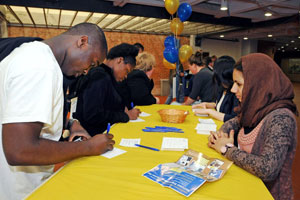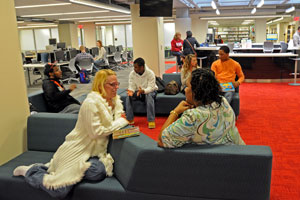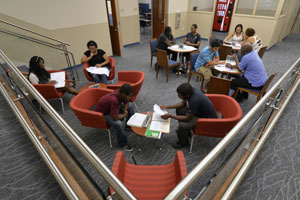Dialogues for Diversity Series 2023-24
Contact Information
Momodu C. Taylor, Ph.D.
Vice President of Institutional Equity
Marple Campus
Founders Hall, Executive Suite, M3590
Email
Related Links and Initiatives
Center for Equity & Social Justice
Diversity at the College
Institutional Diversity Committee
Office of Diversity, Equity & Inclusion
Events and Event Archives
Dialogues for Diversity Upcoming Events Calendar
Dialogues for Diversity Series 2024-25
Dialogues for Diversity Series 2022-23
Dialogues for Diversity Series 2021-22
Stewarding Muhammad Ali's Legacy
with Garret McCorkle, History MA student & Education Associate, Muhammad Ali Center
Thursday, January 18 | 11 a.m. -12 p.m. | Virtual
In honor of Muhammad Ali's Birthday on January 17, join the Office of Diversity, Equity & Inclusion to hear Garret McCorkle, Education Associate from the Muhammad Ali Center in Louisville, Kentucky, speak about the legacy of Muhammad Ali and the work the Center does to exemplify the champ's values. McCorkle is currently getting an MA in history from the University of Louisville. His historical expertise is Louisville and Kentucky history, sports and activism, and Antebellum social history.
Brand Recognition: How Martin Luther King, Jr. Built a Legacy Beyond Trends
with tonya thames-taylor, civil and social historian, West Chester University professor, environmentalist and human rights activist
Tuesday, January 23 | 6:30-7:40 p.m. | In Person: DCCC | Marple Campus | Academic Building | Large Auditorium
Rev. Dr. Martin Luther King, Jr. lived a life of impact and influence different from many of today's social media influencers, who center in creating trends and/or going viral. Dr. King's aesthetics, ministry, service, and political engagement fostered a brand that is associated with style, justice, movement, and effectiveness. How does the estate of Dr. King foster his brand? What does the life and legacy of Dr. King tell us about sustaining a brand?
The World That They Saved: African American Soldiers of WWI and the Civil Rights Movement
with Anthony Taylor, Temple University, Department of Africology and African American Studies Ph.D. Student
Thursday, February 8 | 6:30-7:30 p.m. | Virtual
In the tumultuous era of World War I, African American soldiers not only defended a world in turmoil but also became catalysts for change, challenging the injustices that persisted in their own homeland. In the annals of American history, their contributions have often been overlooked, yet their journey is a testament to the enduring power of hope and determination, as they faced adversity with unwavering courage.
 'Get in the House': Returning the Oral Tradition to the Black Home
'Get in the House': Returning the Oral Tradition to the Black Home
with Paul D. Best, storyteller, writer, and educator
Monday, February 26 | 11 a.m. - 12 p.m. | 6:30 - 7:30 p.m. | Virtual
Paul D. Best, a storyteller, writer, and educator, will present an engaging lecture on the importance of the Oral Tradition in Black families, and how local Black History speaks to the history of America.
Attendees will also be introduced to his current oral history project, “Breaking Uncommon Ground,” where Best is capturing the stories of Black people and their experiences on and along the Delaware River within the past 70 years.
Radical Origins Revived: Harnessing Community-
Engaged Curriculums for Social Change
with Dr. Jennifer Naccarelli, University of Delaware, Department of Women &
Gender Studies
Thursday, March 21 | 12 - 1 p.m. | Virtual
How did a radical movement fighting violence against women become part of state bureaucracies? How can community-engaged learning projects build upon and revive these feminist origins? In honor of Women’s History Month, this talk explores the histories of the “battered women’s movement” and service learning in higher education to think forward about the ways that community-engaged curriculums contribute to social justice transformation.
The experience of a feminist academic program focused on gender-based violence is used to demonstrate how such curriculums are particularly suited not only for transformational academics and practice but also for workforce development.
 Autism and Success in the Classroom
Autism and Success in the Classroom
with Erin Clemens, Alumnus, DCCC Class of 2019
Tuesday, April 2 | 3-5 p.m. | In person on the Marple Campus | Academic Building | Small Auditorium | Virtual
Hear from Erin Clemens, Class of 2019 alum, about achieving academic success at DCCC.
Trajectories of Arab Cultural Institutions in America
with Dr. Alexa Firat, Temple University, Asian and Middle Eastern Languages and Studies
Tuesday, April 16 | 11 a.m.-12 p.m. | Virtual
From the 1920s Pen League (al-rabita al-qalamiya) in New York City to the Arab American National Museum in Dearborn, MI, Arab communities have built significant cultural institutions to celebrate and support their artistic endeavors. This talk will journey through these historical and contemporary institutions with an eye to shedding light on their enduring legacies and significance to their communities.
American Jewish Women’s Long Legacy as Changemakers
with Dr. Melissa R. Klapper, Rowan University, Women’s & Gender Studies
Thursday, May 2 | 11 a.m. -12 p.m. | Virtual
Author of Jewish Girls Coming of Age in America, 1860-1920 (2005); Small Strangers: The Experiences of Immigrant Children in the United States, 1880-1925 (2007); and Ballots, Babies, and Banners of Peace: American Jewish Women's Activism, 1890-1940 (2013), which won the National Jewish Book Award in Women's Studies. Dr. Klapper's most recent book is Ballet Class: An American History (2020) and she will present on American Jewish women's involvement in the first wave feminism (suffrage, birth control, and peace) and the antisemitism they often encountered in social movements.
An Asian Proposal for Overcoming Racism:
Perspectival Shift from Dualism to Nondualism
with Dr. Shigenori Nagatomo, Temple University, Department of
Religion
Wednesday, May 8 | 11 a.m. -12 p.m. | Virtual
Dr. Nagatomo, professor of Comparative Philosophy and East Asian Buddhism at Temple University, will talk about the notion of a conceptual paradigm which shapes how we percieve our lives and those around us. Dr. Nagatomo will discuss two such conceptual paradigms, namely, dualism and nondualism and why dualism has a tendency to foster racism, while nondualism does not. This engaging, reflective talk will make us aware of our own conceptual paradigms and how we have been shaped by them.




















